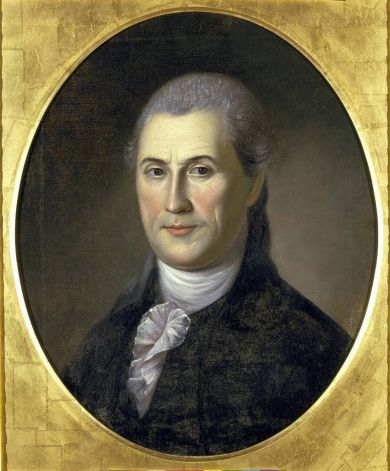<Back to Index>
- Astronomer Giuseppe Piazzi, 1746
- Sculptor Joseph Wilton, 1722
- President of the Continental Congress Samuel Huntington, 1731
PAGE SPONSOR

Samuel Huntington (July 16, 1731 [O.S. July 5, 1731] – January 5, 1796) was a jurist, statesman, and Patriot in the American Revolution from Connecticut. As a delegate to the Continental Congress, he signed the Declaration of Independence and the Articles of Confederation. He also served as President of the Continental Congress from 1779 to 1781, chief justice of the Connecticut Supreme Court from 1784 to 1785, and the 3rd Governor of Connecticut from 1786 until his death.
Samuel was born to Nathaniel and Mehetabel Huntington on July 16, 1731 in Windham, Connecticut (his birthplace is now in Scotland, Connecticut, which broke off from Windham). He was the fourth of ten children, but the oldest boy. He had a limited education in the common schools, then was self educated. When Samuel was 16 he was apprenticed to a cooper, but also continued to help his father on the farm. His education came from the library of Rev. Ebenezer Devotion and books borrowed from local lawyers.
In 1754 Samuel was admitted to the bar, and moved to Norwich, Connecticut, to
begin practising law. He married Martha Devotion (Ebenezer's daughter)
in 1761. They remained together until her death in 1794. While the
couple would not have children, when his brother (Rev. Joseph
Huntington) died they adopted their nephew and niece. They raised Samuel H. Huntington and Frances as their own. After brief service as a selectman,
Huntington began his political career in earnest in 1764 when Norwich
sent him as one of their representatives to the lower house of the
Connecticut Assembly. He continued to be returned to that office each
year until 1774. In 1775 he was elected to the upper house, the
Governor's Council, where he was reelected until 1784. In
addition to serving in the legislature, he was appointed King's
attorney for Connecticut in 1768 and in 1773 was appointed to the
colony's supreme court, then known as the Superior Court. He became
chief justice of the Superior Court in 1784. Huntington was an outspoken critic of the Coercive Acts of the British Parliament. As a result, the assembly elected him in October 1775 to become one of their delegates to the Second Continental Congress. In January 1776 he took his place with Roger Sherman and Oliver Wolcott as the Connecticut delegation in Philadelphia. He voted for and signed the Declaration of Independence and the Articles of Confederation. He suffered from an attack of smallpox while in Congress. While
not known for extensive learning or brilliant speech, Huntington's
steady hard work and unfailing calm manner earned him the respect of
his fellow delegates. As a result, when John Jay left to become minister to Spain, Huntington was elected to succeed him as President of the Continental Congress on
September 28, 1779. The President of Congress was a mostly ceremonial
position with no real authority, but the office did require Huntington
to handle a good deal of correspondence and sign official documents. He
spent his time as president urging the states and their legislatures to
support the levies for men, supplies, and money needed to fight the Revolutionary War. The Articles of Confederation were finally ratified during his term. Huntington
remained as President of Congress until July 9, 1781, when ill health
forced him to resign and return to Connecticut. In 1782, Connecticut
again named him as a delegate, but his health and judicial duties kept
him from accepting. He returned to the Congress as a delegate for the
1783 session to see the success of the revolution embodied in the Treaty of Paris. In 1785 he was elected as Lieutenant Governor for Connecticut, serving with Governor Matthew Griswold.
In 1786 he followed Griswold as Governor of Connecticut, and was
reelected annually until his death in 1796. That same year, in a
reprise of his efforts in Congress, he brokered the Treaty of Hartford that resolved western land claims between New York and Massachusetts. The following year he lent his support to the Northwest Ordinance that completed the national resolution of these issues. In 1788 he presided over the Connecticut Convention that was called to ratify the United States Constitution. In later years he saw the transition of Connecticut into a U.S. State. He resolved the issue of a permanent state capital at Hartford and
oversaw the construction of the state house. He died while in office,
at his home in Norwich on January 5, 1796. His tomb is located down Old
Cemetery Lane adjacent to the Norwichtown Green and its inscription is
in excellent condition. Huntington, Connecticut, was named in his honor in 1789, but later renamed to Shelton, when that town incorporated with Shelton to form a city in 1919. There is still a Huntington Green, however. Huntington County, Indiana is named in his honor. Huntington Mills is a small town in northeastern Pennsylvania which also derives its name in honor of Samuel Huntington. The
home that Samuel was born in was built by his father, Nathaniel, around
1732 and still stands. The area is now within the borders of the town of Scotland, Connecticut. In 1994 the home and some grounds were purchased by a local historic trust. As of 2003 restoration is underway, but parts of the home and grounds are open to visitors at limited times. The Samuel Huntington Birthplace is a National Historic Landmark. His nephew and adopted son Samuel H. Huntington moved to the Ohio country that he had been instrumental in opening up, and later became the third Governor of Ohio. Because Huntington was the President of the Continental Congress when the Articles of Confederation were
ratified, some amateur historians and civic groups in Connecticut have
claimed that Huntington was actually the first President of the United
States.